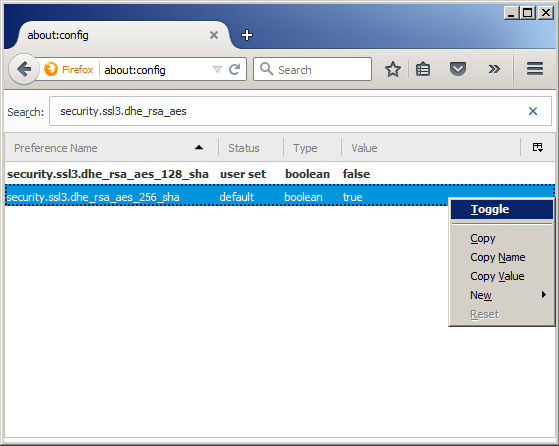Another potential fix worth noting: In your about:config, your user profile may have some settings that have been corrupted. One in particular that was noted here: security.tls.version.max. In particular, the discussion at the linked site points out that somehow the security.tls.version.max setting had been changed from its original value (3) to the new value of 1, and after that change, the. The latest versions of Firefox (39+), Thunderbird (38+) and Chrome (45+) have implemented new security measures that block websites with older, insecure SSL certs. This is to protect against the '.
- Ssl_error_weak_server_ephemeral_dh_key Firefox Fix
- Error Code: Ssl_error_weak_server_ephemeral_dh_key
- Ssl Error Weak Server Ephemeral Dh Key
ERR_SSL_WEAK_SERVER_EPHEMERAL_DH_KEY

Ssl_error_weak_server_ephemeral_dh_key Firefox Fix
Yeah, this is one of the new features coming with the latest version of Google Chrome (45). It basically means that the most used browser is becoming unusable to manage older Cisco products. I faced the problem when I was trying to access one CUCM version 9.x in my lab.
I'm pretty sure there are thousands of products working pretty fine sitting in your private LAN behind a firewall, but you simply cannot use Chrome to access them as all of them require https. I've spent probably half a day looking for a workaround in Chrome but so far I wasn't able to find such.
The message in the browser is saying 'This error can occur when connecting to a secure (HTTPS) server. It means that the server is trying to set up a secure connection but, due to a disastrous misconfiguration, the connection wouldn't be secure at all! In this case the server needs to be fixed. Google Chrome won't use insecure connections in order to protect your privacy.' There is even a link with more instructions about how to fix the problem but all of them are asking you to do the changes on the server side. Well, thanks for that but I simply cannot do it, as Cisco's back end is pretty much closed for changes. Honestly, I think this time Google overdid it!
The 'fix' in the browser is related to a well known security attack called Logjam. You can find more details about it here (https://weakdh.org/).
Workaround for Google Chrome

So, you have some old Cisco product that you cannot access with Google Chrome. What to do now? You have to create new shortcut for your Chrome adding the following startup parameter:
'C:Program Files (x86)GoogleChromeApplicationchrome.exe' --cipher-suite-blacklist=0x0039,0x0033
By doing this you are allowing the weak Diffie-Hellman public keys - TLS_DHE_RSA_WITH_AES_128_CBC_SHA (0x33) and TLS_DHE_RSA_WITH_AES_256_CBC_SHA (0x39) which is absolutely enough to be able to access your Cisco environment with Google Chrome.
Workaround for Mozilla Firefox
When I switched from Firefox to Chrome as a primary browser couple of years ago, I did it with some reserves. And here it comes probably the biggest proof that Firefox is much more mature browser. Mozilla Firefox has the same fix (Error code: ssl_error_weak_server_ephemeral_dh_key) as Google Chrome and it was even released couple of weeks earlier but together with that there is a workaround by modifying some of the advanced settings. Here is a step-by-step guide of how to do that.
Open your Firefox and type in the address bar about:config. There will be a warning message so you will have to promise that you will be careful.
Error Code: Ssl_error_weak_server_ephemeral_dh_key
Once you open the advanced configuration section, type in the Search field ssl3. Change the values of security.ssl3.dhe_rsa_aes_128_sha and security.ssl3.dhe_rsa_aes_256_sha from true to false by simply double clicking on them.
Ssl Error Weak Server Ephemeral Dh Key
That's it! Now you can use Firefox to access your devices which are still running weak Diffie-Hellman ciphers.



Comments are closed.